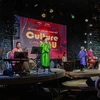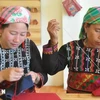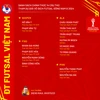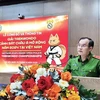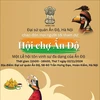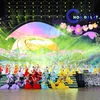 The Vietnamese traditional New Year (Tet) festival actually begins on the 23rd of the last month of the lunar year, which falls on February 4 this year, with the “Ong Cong - Ong Tao” (Land Genie and Kitchen Gods) ritual. On this day, people cook or buy many delicacies to offer to the gods, clean and decorate the family’s altar with flowers and fruits and burn paper clothes and paper carps for use by the gods on their journey to heaven. It is also a tradition to release live carps in rivers and lakes as a means of transport for the gods and also as a sign of good deed to invite good luck. (Photo: VietnamPlus)
The Vietnamese traditional New Year (Tet) festival actually begins on the 23rd of the last month of the lunar year, which falls on February 4 this year, with the “Ong Cong - Ong Tao” (Land Genie and Kitchen Gods) ritual. On this day, people cook or buy many delicacies to offer to the gods, clean and decorate the family’s altar with flowers and fruits and burn paper clothes and paper carps for use by the gods on their journey to heaven. It is also a tradition to release live carps in rivers and lakes as a means of transport for the gods and also as a sign of good deed to invite good luck. (Photo: VietnamPlus)  On the day, every family is busy staging a ceremony to send off the Land Genie and the Kitchen Gods of the household on their yearly visit of Heaven. The Kitchen Gods, the guardian spirit of the kitchen, are believed to comprise two male gods and one female, who bless the household and keep up the kitchen fire, making every member of the family happy and well-off. As the legend goes, the Land Genie and the Kitchen Gods will ride carps to Heaven on the day (23r of the last lunar month) to deliver an annual report on the household’s activities to the God of Heaven. (Photo: VietnamPlus)
On the day, every family is busy staging a ceremony to send off the Land Genie and the Kitchen Gods of the household on their yearly visit of Heaven. The Kitchen Gods, the guardian spirit of the kitchen, are believed to comprise two male gods and one female, who bless the household and keep up the kitchen fire, making every member of the family happy and well-off. As the legend goes, the Land Genie and the Kitchen Gods will ride carps to Heaven on the day (23r of the last lunar month) to deliver an annual report on the household’s activities to the God of Heaven. (Photo: VietnamPlus)  At Long Bien bridge, many volunteers help local people release carps safely. As the gods make their journey on the back of fish, traditions dictate the release of live carps into lakes or rivers, which is considered a kind-hearted deed to pray for good luck. Vietnamese people attach significance to this year-end departure by tidying the kitchen and making offerings on a specially designed alter. On that day, people also burn paper clothing, including hats, robes and boots, intended for use by the genies on the trip beyond. The Kitchen Gods day is one of the most sacred and meaningful annual events that officially starts the traditional Tet. (Photo: VietnamPlus)
At Long Bien bridge, many volunteers help local people release carps safely. As the gods make their journey on the back of fish, traditions dictate the release of live carps into lakes or rivers, which is considered a kind-hearted deed to pray for good luck. Vietnamese people attach significance to this year-end departure by tidying the kitchen and making offerings on a specially designed alter. On that day, people also burn paper clothing, including hats, robes and boots, intended for use by the genies on the trip beyond. The Kitchen Gods day is one of the most sacred and meaningful annual events that officially starts the traditional Tet. (Photo: VietnamPlus)  A group of youth volunteers from Hanoi gathered in Long Bien bridge, helping people to do the ritual of fish releasing in an environmentally friendly way. On New Year's Eve, both genies will return to earth and resume their caretaking duties in the kitchen of the house. Although residents in each region across the country pay their homage to Ong Cong and Ong Tao in slightly different ways, the gods remain important figures in the rich texture of Vietnamese New Year. The fire in the kitchen is the symbol of not only warm family union, but also a bumper harvest and agricultural development of Vietnamese people. The custom of worshipping the Kitchen Gods reflects Vietnamese’s respect of family happiness. (Photo: VietnamPlus)
A group of youth volunteers from Hanoi gathered in Long Bien bridge, helping people to do the ritual of fish releasing in an environmentally friendly way. On New Year's Eve, both genies will return to earth and resume their caretaking duties in the kitchen of the house. Although residents in each region across the country pay their homage to Ong Cong and Ong Tao in slightly different ways, the gods remain important figures in the rich texture of Vietnamese New Year. The fire in the kitchen is the symbol of not only warm family union, but also a bumper harvest and agricultural development of Vietnamese people. The custom of worshipping the Kitchen Gods reflects Vietnamese’s respect of family happiness. (Photo: VietnamPlus)  The volunteers put the golden carps into a bucket before releasing them into the Red River. Although the traditional practice of releasing carps into rivers and lakes are seen as a way to provide the Kitchen Gods with a means of transport to heaven, the carp are often accompanied by plastic containers and environmentally unfriendly offering items. In recent years, as awareness about plastic pollution grows, environmental groups have started to organize special drop-off points for the carp, so as to better manage the excess waste caused by stray plastic bags. On Hanoi’s iconic Long Bien Bridge, one group carried signs that read “Release the fish, not the plastic”. (Photo: VietnamPlus)
The volunteers put the golden carps into a bucket before releasing them into the Red River. Although the traditional practice of releasing carps into rivers and lakes are seen as a way to provide the Kitchen Gods with a means of transport to heaven, the carp are often accompanied by plastic containers and environmentally unfriendly offering items. In recent years, as awareness about plastic pollution grows, environmental groups have started to organize special drop-off points for the carp, so as to better manage the excess waste caused by stray plastic bags. On Hanoi’s iconic Long Bien Bridge, one group carried signs that read “Release the fish, not the plastic”. (Photo: VietnamPlus)  People release carps on the Kitchen Gods day on Thanh Nien Street. Large lakes around Hanoi like West Lake were filled with plastic bags and incense burners that were released with the fish in previous years. Furthermore, many people are actually throwing the fish to their deaths. According to Thich Tinh Giac, a monk, releasing carp is an act to honour life so pollution should not be tolerated. Many lakes and rivers in Hanoi have been polluted. The problem came into spotlight after more than 100 tonnes of fish washed up dead in the West Lake in 2016. The city subsequently announced plans to splash out 16.2 trillion VND (701.9 million USD) on a sewage treatment project. (Photo: VietnamPlus)
People release carps on the Kitchen Gods day on Thanh Nien Street. Large lakes around Hanoi like West Lake were filled with plastic bags and incense burners that were released with the fish in previous years. Furthermore, many people are actually throwing the fish to their deaths. According to Thich Tinh Giac, a monk, releasing carp is an act to honour life so pollution should not be tolerated. Many lakes and rivers in Hanoi have been polluted. The problem came into spotlight after more than 100 tonnes of fish washed up dead in the West Lake in 2016. The city subsequently announced plans to splash out 16.2 trillion VND (701.9 million USD) on a sewage treatment project. (Photo: VietnamPlus)  Fish are trapped in mud and polluted water. The Vietnamese traditional New Year (Tet) festival actually begins on the 23rd day of the last month of the lunar year, which falls on February 4 this year, with the “Ong Cong - Ong Tao” (Land Genie and Kitchen Gods) ritual. On this day, people cook or buy many delicacies to offer to the gods, clean and decorate the family’s altar with flowers and fruits and burn paper clothes and paper carps for use by the gods on their journey to heaven. It is also a tradition to release live carps in rivers and lakes as a means of transport for the gods and also as a sign of good deed to invite good luck. (Photo: VietnamPlus)
Fish are trapped in mud and polluted water. The Vietnamese traditional New Year (Tet) festival actually begins on the 23rd day of the last month of the lunar year, which falls on February 4 this year, with the “Ong Cong - Ong Tao” (Land Genie and Kitchen Gods) ritual. On this day, people cook or buy many delicacies to offer to the gods, clean and decorate the family’s altar with flowers and fruits and burn paper clothes and paper carps for use by the gods on their journey to heaven. It is also a tradition to release live carps in rivers and lakes as a means of transport for the gods and also as a sign of good deed to invite good luck. (Photo: VietnamPlus)  A young man is releasing carp at Truc Bach Lake. Vietnamese people attach significance to this year-end departure by tidying the kitchen and making offerings on a specially designed alter. On that day, people also burn paper clothing, including hats, robes and boots, intended for use by the genies on the trip beyond. The Kitchen Gods day is one of the most sacred and meaningful annual events that officially starts the traditional Tet. The Kitchen Gods, the guardian spirit of the kitchen, are believed to comprise two male gods and one female, who bless the household and keep up the kitchen fire, making every member of the family happy and well-off. (Photo: VietnamPlus)
A young man is releasing carp at Truc Bach Lake. Vietnamese people attach significance to this year-end departure by tidying the kitchen and making offerings on a specially designed alter. On that day, people also burn paper clothing, including hats, robes and boots, intended for use by the genies on the trip beyond. The Kitchen Gods day is one of the most sacred and meaningful annual events that officially starts the traditional Tet. The Kitchen Gods, the guardian spirit of the kitchen, are believed to comprise two male gods and one female, who bless the household and keep up the kitchen fire, making every member of the family happy and well-off. (Photo: VietnamPlus)  As the legend goes, the Land Genie and the Kitchen Gods will ride carps to Heaven on the day to deliver an annual report on the household's activities to the God of Heaven. Since the gods make their journey on the back of fish, it is traditional to release live carps into lakes or rivers, which is considered a kindhearted deed to pray for good luck. On that day, people also burn paper clothing, including hats, robes and boots, intended for use by the genies on the trip beyond. After the Kitchen Gods go to Heaven, families begin tidying and decorating their houses to usher in the New Year as they believe that a clean house represents a fresh star. (Photo: VietnamPlus)
As the legend goes, the Land Genie and the Kitchen Gods will ride carps to Heaven on the day to deliver an annual report on the household's activities to the God of Heaven. Since the gods make their journey on the back of fish, it is traditional to release live carps into lakes or rivers, which is considered a kindhearted deed to pray for good luck. On that day, people also burn paper clothing, including hats, robes and boots, intended for use by the genies on the trip beyond. After the Kitchen Gods go to Heaven, families begin tidying and decorating their houses to usher in the New Year as they believe that a clean house represents a fresh star. (Photo: VietnamPlus)  Nguyen Vu Ngoc Bich from Thien Tam An centre are collecting plastic bags from a carp drop-off point at West Lake. She said she has been closed to the work for seven years. Although the traditional practice of releasing carps into rivers and lakes are seen as a way to provide the Kitchen Gods with a means of transport to heaven, the carp are often accompanied by plastic containers and environmentally unfriendly offering items. Many lakes and rivers in Hanoi have been polluted. The problem came into spotlight after more than 100 tonnes of fish washed up dead in the West Lake in 2016. (Photo: VietnamPlus)
Nguyen Vu Ngoc Bich from Thien Tam An centre are collecting plastic bags from a carp drop-off point at West Lake. She said she has been closed to the work for seven years. Although the traditional practice of releasing carps into rivers and lakes are seen as a way to provide the Kitchen Gods with a means of transport to heaven, the carp are often accompanied by plastic containers and environmentally unfriendly offering items. Many lakes and rivers in Hanoi have been polluted. The problem came into spotlight after more than 100 tonnes of fish washed up dead in the West Lake in 2016. (Photo: VietnamPlus)  Kids are taken to the river to release carp. The Vietnamese believe there are three Kitchen Gods, and carp serve as their means of transport to heaven so they can report to the Jade Emperor. According to the tradition, after prayers to the Kitchen Gods have been made, people release carp into ponds, lakes and rivers. Previously, carps were sell like hot cakes ahead of Kitchen God day. There was a time a kilo of carp fetching 150,000 VND (6.5 USD). However, this year, traders at fish wholesale market experienced a drop in trade, with prices also plummeting. Many of them were suffering a drought of customers who stopped using real carp and instead use fish made out of paper or food for the ritual. (Photo: VietnamPlus)
Kids are taken to the river to release carp. The Vietnamese believe there are three Kitchen Gods, and carp serve as their means of transport to heaven so they can report to the Jade Emperor. According to the tradition, after prayers to the Kitchen Gods have been made, people release carp into ponds, lakes and rivers. Previously, carps were sell like hot cakes ahead of Kitchen God day. There was a time a kilo of carp fetching 150,000 VND (6.5 USD). However, this year, traders at fish wholesale market experienced a drop in trade, with prices also plummeting. Many of them were suffering a drought of customers who stopped using real carp and instead use fish made out of paper or food for the ritual. (Photo: VietnamPlus)  The fated woman and her two husbands are beloved household gods in Vietnam. There’s probably never a happy ending to a love triangle, especially one that ends in the sorrowful demise of the star-crossed lovers. In Confucianism-dominated Vietnam, where fidelity is usually something to value, especially among women, a love triangle between a woman and two men has yet been worshipped for generations. Vietnamese people give them the beloved title “Kitchen Gods” and regard them as the guardians of the most important part of the house. Vietnamese people believe that the trinity travel to heaven once a year on the 23rd day of lunar December, or January 20 this year, to report the family’s affairs to the emperor. (Photo: VietnamPlus)
The fated woman and her two husbands are beloved household gods in Vietnam. There’s probably never a happy ending to a love triangle, especially one that ends in the sorrowful demise of the star-crossed lovers. In Confucianism-dominated Vietnam, where fidelity is usually something to value, especially among women, a love triangle between a woman and two men has yet been worshipped for generations. Vietnamese people give them the beloved title “Kitchen Gods” and regard them as the guardians of the most important part of the house. Vietnamese people believe that the trinity travel to heaven once a year on the 23rd day of lunar December, or January 20 this year, to report the family’s affairs to the emperor. (Photo: VietnamPlus)  After the Kitchen Gods go to Heaven, families begin tidying and decorating their houses to usher in the New Year as they believe that a clean house represents a fresh star. On New Year's Eve, both genies will return to earth and resume their caretaking duties in the kitchen of the house. Although residents in each region across the country pay their homage to Ong Cong and Ong Tao in slightly different ways, the gods remain important figures in the rich texture of Vietnamese New Year. The fire in the kitchen is the symbol of not only warm family union, but also a bumper harvest and agricultural development of Vietnamese people. The custom of worshipping the Kitchen Gods reflects Vietnamese's respect of family happiness. (Photo: VietnamPlus)
After the Kitchen Gods go to Heaven, families begin tidying and decorating their houses to usher in the New Year as they believe that a clean house represents a fresh star. On New Year's Eve, both genies will return to earth and resume their caretaking duties in the kitchen of the house. Although residents in each region across the country pay their homage to Ong Cong and Ong Tao in slightly different ways, the gods remain important figures in the rich texture of Vietnamese New Year. The fire in the kitchen is the symbol of not only warm family union, but also a bumper harvest and agricultural development of Vietnamese people. The custom of worshipping the Kitchen Gods reflects Vietnamese's respect of family happiness. (Photo: VietnamPlus)  As the gods make their journey on the back of fish, traditions dictate the release of live carps into lakes or rivers, which is considered a kind-hearted deed to pray for good luck. Vietnamese people attach significance to this year-end departure by tidying the kitchen and making offerings on a specially designed alter. On that day (the 23rd day of the last month of the lunar year), people also burn paper clothing, including hats, robes and boots, intended for use by the genies on the trip beyond. The Kitchen Gods day is one of the most sacred and meaningful annual events that officially starts the traditional Tet. (Photo: VietnamPlus)
As the gods make their journey on the back of fish, traditions dictate the release of live carps into lakes or rivers, which is considered a kind-hearted deed to pray for good luck. Vietnamese people attach significance to this year-end departure by tidying the kitchen and making offerings on a specially designed alter. On that day (the 23rd day of the last month of the lunar year), people also burn paper clothing, including hats, robes and boots, intended for use by the genies on the trip beyond. The Kitchen Gods day is one of the most sacred and meaningful annual events that officially starts the traditional Tet. (Photo: VietnamPlus) VNA





